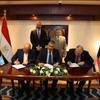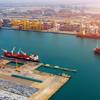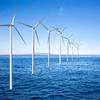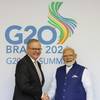Putin Sees No Need To Sanction West, May Review Energy Ties
Russian President Vladimir Putin said on Tuesday that Moscow saw no need for counter sanctions against the West, but could reconsider the participation of Western companies in its economy, including energy projects.
"We would very much wish not to resort to any measures in response. I hope we won't get to that point," he told reporters after meeting with the leaders of Belarus and Kazakhstan.
"But if something like that continues, we will of course have to think about who is working in the key sectors of the Russian economy, including the energy sector, and how."
The United States on Monday unveiled a new round of sanctions aimed at business leaders and companies close to Putin, while the European Union followed up on Tuesday by naming 15 Russians and Ukrainians to its blacklist, moving to freeze assets and deny visas.
"Regarding the second package, it's not clear at all what this is linked to, because there is no cause and effect link with what is happening now in Ukraine and Russia," he said.
SIGNIFICANT TIES
Though some Western oil companies left Russia in recent years because of a difficult business climate, U.S. companies Exxon Mobil and Chevron Corp, along with British major BP, have significant ties there.
Igor Sechin, the head of state-controlled Rosneft, was named in the latest U.S. sanctions, though not his company, in which BP holds an 18.5 percent stake.
In Russia, Exxon Mobil's net acreage holdings in Sakhalin at the end of 2013 totaled 85,000 acres, all offshore, and its net acreage in the Rosneft joint venture agreements for the Kara and Black Seas was 11.3 million acres. The two companies also have a joint venture to evaluate the development of tight-oil reserves in western Siberia.
In the United States, Rosneft unit Neftegaz in March 2013 bought a 30 percent stake in 20 deepwater exploration blocks held by Exxon in the U.S. Gulf of Mexico.
Exxon Mobil declined to comment on Putin's latest comments on Tuesday.
Meanwhile, Chevron Corp owns a 15 percent stake in the Caspian Pipeline Consortium, which transports crude oil from Kazakhstan through Russia to the Black Sea. The company also sells lubricants in Russia used in engines for ships and agricultural equipment.
Chevron declined to comment on Putin's latest statements, but said it was monitoring the region closely.
Putin reiterated his accusations that the United States was orchestrating the Ukraine crisis and urged Kiev and pro-Russia protesters to respect the Geneva agreements, reached on April 17 and intended to defuse the crisis, and sit down at the negotiation table.
The United States and European Union accuse Moscow of orchestrating an uprising of pro-Russian separatists in southeastern Ukraine. The crisis has brought relations between the West and Russia to their lowest since the end of the Cold War.
(Reporting by Darya Korsunskaya, Anna Driver and Ernest Scheyder; Writing by Alexei Anishchuk; editing by G Crosse, Nigel Stephenson and Terry Wade)












